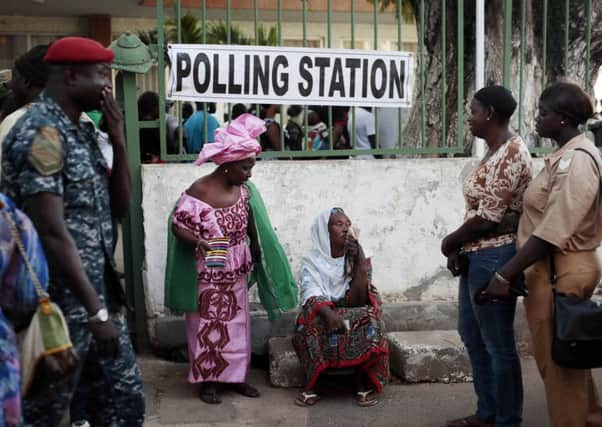Gambia ruler predicts landslide as internet blocked for election


President Yahya Jammeh has vowed not to allow protests of any kind, and the country’s phone and internet services were cut hours ahead of polling stations opening in an effort to thwart unrest.
“This will be the biggest landslide in the history of the country,” Mr Jammeh said yesterday after voting with his wife in the capital. He was met with cheers as he walked toward his sports utility vehicle and refused to comment when asked whether he would concede in the event of defeat.
Advertisement
Hide AdAdvertisement
Hide AdHis challenger Adama Borrow said he believed Gambians were ready for change after more than 20 years of the Jammeh regime. “He is not going to be re-elected – his era is finished,” Mr Barrow said.
Most voters refused to comment on which candidate they were backing.
Inside polling stations, each person places a marble in either a green, silver or purple drum depending on their choice.
The African Union sent a handful of observers to this country of 1.9 million but there are no observers from the European Union or the West African regional bloc ECOWAS because the Gambian government did not grant them accreditation.
Mr Jammeh came to power in a coup in 1994, and then swept elections in 1996, 2001, 2006 and 2011, after a 2002 constitutional amendment removed presidential term limits. Critics, though, say those elections were not free and fair, and they accuse his regime of corruption and human rights abuses.
The long-time leader has said that his victory is all but assured with divine intervention. Demonstrations will not be allowed “because those are the loopholes that are used to destabilise African governments,” he said.
Mr Jammeh’s supporters praise his efforts to boost economic development in the small country that is dependent on tourism and agriculture.
“He has built the airport, schools, medical facilities and buildings,” said 50-year-old Pinta Manneh. She could not imagine an opposition victory. “He will be angry if he loses,” she said.
Mr Barrow, a former businessman and United Democratic Party leader, emerged as the candidate for an alliance of eight opposition parties.